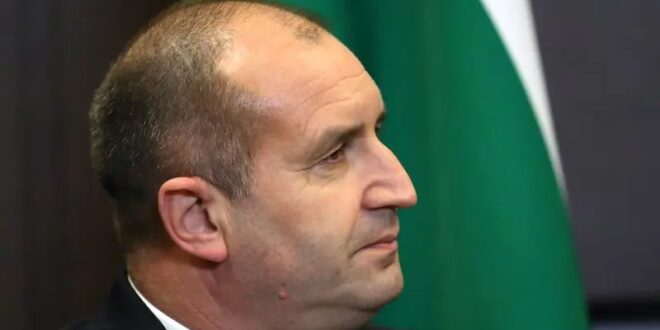At a historic summit next week in Washington, NATO will be celebrating its 75th anniversary and strategizing how to further aid Ukraine against Russia’s full-scale invasion.
Heads of state and government from the alliance’s 32 members — including Sweden, which just joined in March, and Finland, which joined in April 2023 — are scheduled to attend the gathering from July 9-11.
Noticeably absent, however, will be the president of Bulgaria, which has been a member of NATO since 2004. Rumen Radev has said he was not consulted over a document to be presented at the summit that spells out Bulgaria’s official stance on Russia’s war against Ukraine and the alliance’s commitments to helping Kyiv. Instead, only acting Prime Minister Dimitar Glavchev will attend, instead of together with Radev as had been planned.
Radev, 61, whose position is largely ceremonial but offers a platform to influence public opinion, has made clear he does not support sending military aid to Ukraine, arguing such assistance only prolongs the conflict. He has referred to those who favor such support as “warmongers.”
Delyan Peevski, leader of the liberal Movement For Rights And Freedoms (DPS) and one of Radev’s more vocal critics, called the refusal “a confirmation that Radev’s positions serve foreign, not national interests and are subjected to dependencies and ties in the East, contrary to the Euro-Atlantic values and principles.” (Peevski has been sanctioned by the United States and Britain for alleged corruption.)
Others have expressed relief that Radev will not be accompanying Glavchev to the summit, amid worries the former air force pilot could use the gathering as a platform to air his Kremlin-friendly views.
“In order to find a positive in the whole picture, at least we won’t have any worries that Bulgaria will have an ambiguous position at the meeting in Washington,” offered Elena Poptodorova, a former Bulgarian ambassador to the United States.
“Otherwise, we would have been nervously waiting to see exactly how the president would represent the national position if he were Bulgaria’s official spokesperson in Washington,” Poptodorova told RFE/RL’s Bulgarian Service.
NATO Skepticism
Radev said his decision to boycott the NATO summit hinged on his role, or lack thereof, in crafting Bulgaria’s official stance and its commitments regarding Russia’s war on Ukraine. Radev said he was not consulted when the Council of Ministers — Bulgaria’s top executive body comprising the prime minister and other senior ministers — agreed on the provisions of this position, his office said on June 27.
Failure to publicly release the government’s position has fueled speculation by some politicians, mostly those friendly to the Kremlin, that officials were up to something more sinister.
“I hope that we will all see what is written in this text and understand why it was in no way consulted in advance with the president, [and] why there are reservations about it being presented to [parliament],” said Vice President Iliana Iotova, Radev’s running mate in the 2016 presidential election, on June 27.
On June 28, the government press office did state that the position staked out by the Council of Ministers includes a reaffirmation of Sofia’s military support for Kyiv, as well as an understanding that Ukraine should not be forced to give up territory to achieve any peace with Russia.
Acting Defense Minister Atanas Zapryanov added that the official position could not be published because it also contained classified information.
A few days later on July 1, acting premier Glavchev did say he would send later that day the contents of Sofia’s official position to the Classified Information Registry of parliament. That would allow deputies in the National Assembly, Bulgaria’s unicameral parliament, to familiarize themselves with its content.
Glavchev dismissed as “absurd” allegations that the cabinet may be pushing Bulgaria into war. “There is nothing in it that is different from the positions and the resolutions of the National Assembly,” he added.
Radev has long voiced skepticism of NATO aiding Ukraine and has tried to blocksuch efforts, claiming it will only fuel a wider conflict, a narrative embraced by other pro-Kremlin figures, including Hungarian Prime Minister Viktor Orban.
In fact, in May, when Sofia hosted a meeting of the NATO Parliamentary Assembly, Radev instead traveled to Budapest for talks with Orban, whose government has also worked to block aid to Ukraine.
The upcoming summit in Washington will focus on three major topics, according to Jens Stoltenberg, NATO’s secretary-general, with supporting Ukraine’s efforts to defend itself “the most urgent” agenda item.
By not attending, Radev will be sending a “harmful” message to Bulgaria’s NATO’s partners, said Assen Agov, a former Bulgarian lawmaker and ex-deputy chairman of the NATO Parliamentary Assembly.
“He’s discrediting the country, thinking he’s scoring points in some peace process that doesn’t exist,” Agov told RFE/RL.
 Eurasia Press & News
Eurasia Press & News




